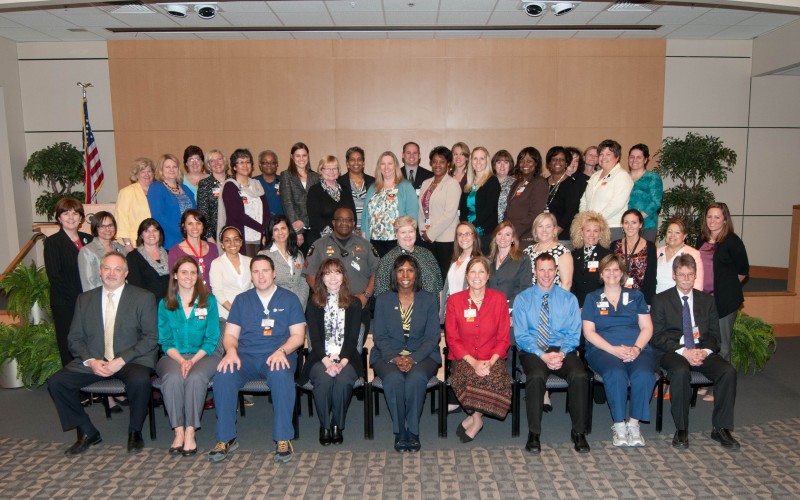Future leaders gain skills through Making an Impact

The first class of future leaders at Christiana Care graduated April 8 from Making An Impact, a year-long, hands-on program intended to recognize and enhance participants’ contribution in their current positions as well as prepare them for future roles. Members of the inaugural class celebrated their achievement by making presentations on projects they designed and developed as the managers, directors and vice presidents who mentored them listened.
Making An Impact is designed to build leadership skills such as problem solving, teamwork, coaching and influencing others, explained Barbara A. Monegan, director of talent management and leadership development at the Christiana Care Learning Institute.
“Everyone here is a person we see as a future manager,” Monegan said. “This program is designed to give them the skills they need to realize their potential.”
Launched in April 2013, the program encompassed four full-day workshops and the results summit. Making An Impact was customized for Christiana Care by the Learning Institute’s Center for Transforming Leadership in partnership with the Advisory Board Company.
Gary Ferguson, chief operating officer, talked about the challenge of providing expert care as well as superior value in an era of sweeping health care reform. Finding new ways to enhance both care and efficiency is an essential part of that journey.
“What you are doing is helping us to prepare for the future,” he said.
The 41 participants worked in small groups with a coach, who may be a manager or director, but who is not their reporting manager. Most participants worked on two projects: a small project to learn problem-solving tools and a larger project to learn teamwork and influence in the midst of problem solving.
Coaches met with their teams throughout the year, not only to ensure projects are on track but to help participants navigate the health system and develop relationships to overcome barriers. It’s less about the project than about building leadership capability at all levels and across disciplines, Monegan said.
Graduates come from fields throughout the health system, from a variety of clinical and non-clinical positions including environmental services, imaging, IT and security.
Nearly half the rising stars are nurses. Janet Cunningham, RN, MHA, NEA-BC, CENP, vice president, professional excellence, and associate chief nursing officer, who served as a coach, said developing projects designed to improve care reflects Christiana Care’s Magnet designation for nursing excellence.
“I am very impressed by the level of projects the participants chose; most were focused on supporting front line staff,” she said. “Working and learning together in interprofessional groups is the future of innovative care delivery.”
Claudia Angelica Reyes-Hull, a Languages Services supervisor, was coached by Kimberly Talley, director of Patient Care Services. Reyes-Hull came up with a system to capture data for document translation that allowed the department to better track requests, as well as recognize the efforts of employees who do this work in-house.
As a result, less work is outsourced, turnaround is quicker and costs have been reduced.
“This program gave me the tools to lead a team,” Reyes-Hull said. “It enabled me to see my team in a different way so that I could delegate. I learned to get at the root of a problem.”